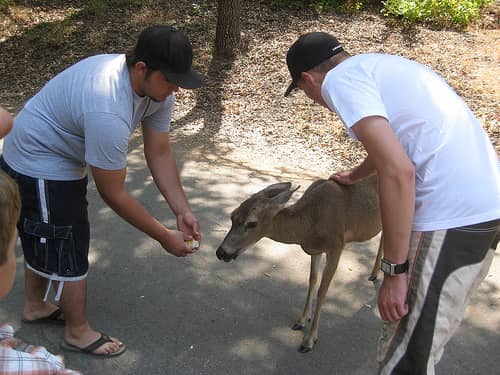Keeping Deer as ‘Pets’ Isn’t Just a Bad Idea, It’s Also Illegal
OutdoorHub 02.10.12

In the past week, the Division of Fish and Wildlife Enforcement Section has responded to three separate incidents in which white-tailed deer were either kept as pets illegally or raised by people and then released to roam free. In each of these instances, the animals were living in the wild but had lost their natural wariness of humans and would readily approach them looking for food. Two of these incidents involved minor injuries to a neighbor, one of whom was a child.
“Wild animals are just that – wild. Yet people will still take them home or try to care for them when they are young or injured,” said DNREC Wildlife Biologist Joe Rogerson. “Unless you are a trained and permitted wildlife rehabilitator, you cannot legally keep a white-tailed deer. If you encounter what you think is an injured or abandoned deer, contact the Division of Fish and Wildlife before attempting to approach or handle the animal. Also, please do not feed deer to try to domesticate them.”
Under Delaware law individuals who try to “rescue” a deer may face penalties. “Not only is removing a fawn or adult deer from its natural habitat not in its best interest, it is also illegal for an individual in Delaware to possess a live white-tailed deer without a permit issued by the Division of Fish and Wildlife,” said Sgt. Gregory Rhodes of Fish and Wildlife Enforcement.
If found guilty, such an offense is punishable by a fine not less than $250, and up to $1,000, plus the costs of prosecution and court costs. The person may also be fined and imprisoned for up to 30 days. In addition, any deer held illegally in captivity will be removed by the Division of Fish and Wildlife.
Wildlife rehabilitators are trained to handle the wild creatures under their care, and know to expect instinctive responses such as an animal striking out if it feels threatened. Overall, however, research has shown that deer cared for by people – even trained rehabilitators – have a greatly decreased chance of survival once they are released back into the wild, especially if they were taken into captivity as fawns.
“Fawns raised in the wild are able to learn survival instincts from their mothers that people simply can’t teach them,” Rogerson said. “The bottom line is, if you really care about the deer and its well-being, please leave the animal alone. A deer will have a greater chance at survival if you don’t take it home or try to domesticate it.”
For more information about white-tailed deer, please contact Joe Rogerson, Wildlife Section, at 302-739-9912. To report suspected wildlife violations, call Fish and Wildlife Enforcement’s 24-hour dispatch center at 302-739-4580.
“Tips from the general public help us initiate a lot of our investigations, and can be helpful to properly address matters such as deer being kept illegally as pets. Individuals wanting to remain anonymous with their tip may do so,” added Sgt. Rhodes.

